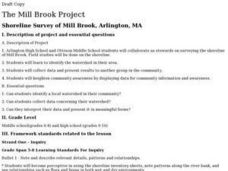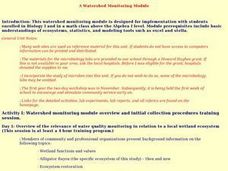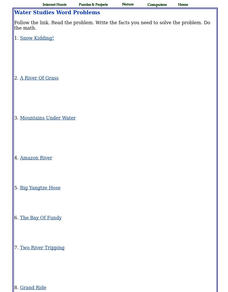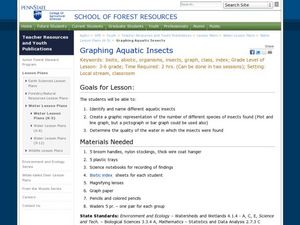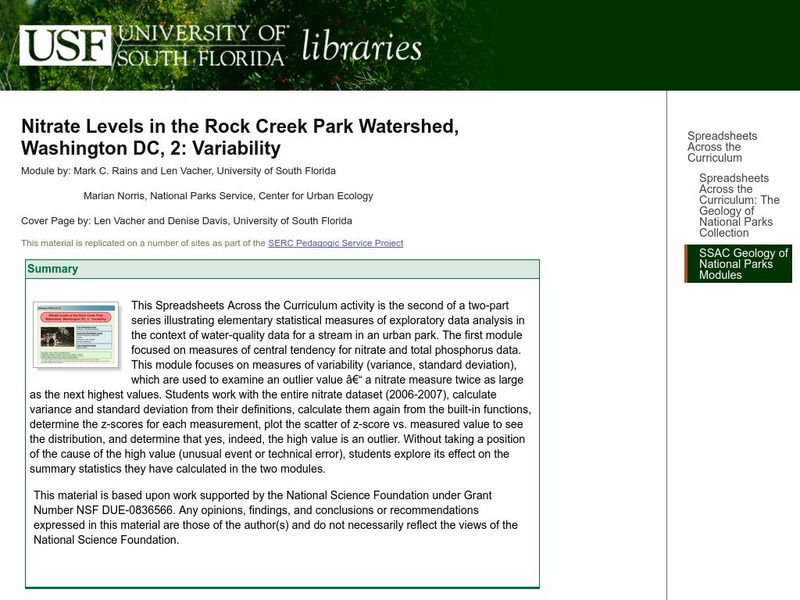Curated OER
The Study of Urban and Suburban Environments within the Mystic River Watershed
High school students examine their own water-based environments, within the Mystic Watershed. As the learners engage in inquiry-based, hands-on projects, critical thinking skills and problem-solving, the project will lead them to cross...
Curated OER
Watershed Investigations
Students explore the components of a watershed and the factors that affect it. They read a topographical map and use geometry to determine the area of a watershed. Students estimate the volume of a body of water and perform runoff...
Curated OER
Drawing Water
Students investigate the NYC water supply system and its watershed. In this water supply lesson, students read the Magic School Bus at the Waterworks to help them identify the components of the water supply system. Students diagram the...
Curated OER
Our Keystone FFA Spring
Students identify where their water sources and explore a watershed on a map. For this watershed lesson students walk a wetland, and identify sources of pollution.
Curated OER
Chesapeake Bay Watershed Project
Learners conduct a simulation to determine the health of local streams and rivers. They role-play as researchers, scientists, politicians, and writers and use technology to implement plans to improve the quality of waterbodies.
Curated OER
Watershed Model
Students view a presentation of water and land and how we need to protect our water resources. In this water lesson plan, students discuss how we rely on water, and complete activities in all subjects related to water.
Curated OER
How Healthy is the Wetland?
Students explore wetlands. In this ecology lesson, students visit a wetland site and collect data about the wetland functions. Students record their results and use the data recorded to rate the wetland site on its function.
NASA
The Case of the Wacky Water Cycle
Join the tree house detectives in learning about the processes of the water cycle, water conservation, water treatment, and water as a limited resource.
Curated OER
A Watershed Monitoring Module
Students explore the relevance of water quality monitoring in relation to a local wetland ecosystem. They conduct standard water quality tests using wet tests and CBL calculators and probes. Student record and interpret the results.
Curated OER
Graphing the Population Explosion of Weeds
Students are introduced to the seed cycle and draw the specific steps. In groups, they identify the human barriers to the spreading of weeds. After calculating the rate of spreading of the Yellowstar Thistle, they create graphs to see a...
Curated OER
Teaching Modeling Water Quality
High schoolers explore the basics of interpreting RUSS temperature and oxygen profile data. They are introduced to the Geographic Information Systems (GIS), particularly with respect to interpreting maps.
Curated OER
Five Little Ladybugs
For this counting poem, student read a poem about ladybugs and count backward from 5 until there are no ladybugs left.
Curated OER
Ladybug Identification
For this ladybug pattern identification worksheet, learners count and record the number of spots on the elytra of 13 ladybug species.
Curated OER
Water Studies Word Problems
In this water learning exercise, students read mini articles and solve math word problems having to do with water. Students complete 16 word problems.
Curated OER
Is the Hudson River Too Salty to Drink?
Students explore reasons for varied salinity in bodies of water. In this geographical inquiry lesson plan, students use a variety of visual and written information including maps, data tables, and graphs, to form a hypothesis as to why...
Curated OER
Designing a Study
Students explore features to consider when designing a scientific study. In this science research lesson plan, students examine different methods of data collection and consider which method would be appropriate for determining how many...
Curated OER
Rivers, Maps, and Math
Middle schoolers use maps to locate and label the major rivers of North and South America. Using the internet, they identify forests, grasslands, mountain ranges and other landforms on the continents as well. They compare and contrast...
Curated OER
Risk Assessment and Geometry
Tenth graders study the concept of risk analysis as it relates to geometry. In this spatial relationship instructional activity, 10th graders are provided a set of coordinates to analyze a piece of land described. Students write a...
Curated OER
Graphing Aquatic Insects
Students identify aquatic insects. For this organism lesson, students locate aquatic insects near a local waterway and collect them. Students graph the amount of insects that they collected.
Curated OER
Fish Now or Later
Students describe the effects of over-harvest on a salmon population. They explain the importance of salmon to many communities in Alaska. They manage harvest levels to maintain a sustainable population.
Curated OER
Locating the Salt Front
Young scholars use Hudson River salinity data to create a line
graph that shows the location of the salt front, and use math
skills to explore how this location varies over time. They use the graph to estimate the location of the salt...
Science Education Resource Center at Carleton College
Serc: Nitrate Levels in the Rock Creek Park Watershed: Meas of Central Tendency
Activity uses water-quality data from Rock Creek Park to illustrate elementary statistical measures of exploratory data analysis. The focus of the lesson is the nutrient limitation in a stream and the three measures of central tendency.
Science Education Resource Center at Carleton College
Serc: Nitrate Levels in the Rock Creek Park Watershed: Variability
Learning module focuses on measures of variability such as range, variance, and standard deviation which are used to examine nitrate levels and water quality.
Other popular searches
- Mississippi River Watershed
- Chesapeake Bay Watershed
- Watershed Hydrology
- Watershed and Water Quality
- Watersheds and Wetlands
- Watershed and Drinking Water
- Great Lakes Watershed
- Apalichicola River Watershed
- Delineate a Watershed
- Watershed Management
- Virginia Watersheds
- Pennsylvania Watersheds
